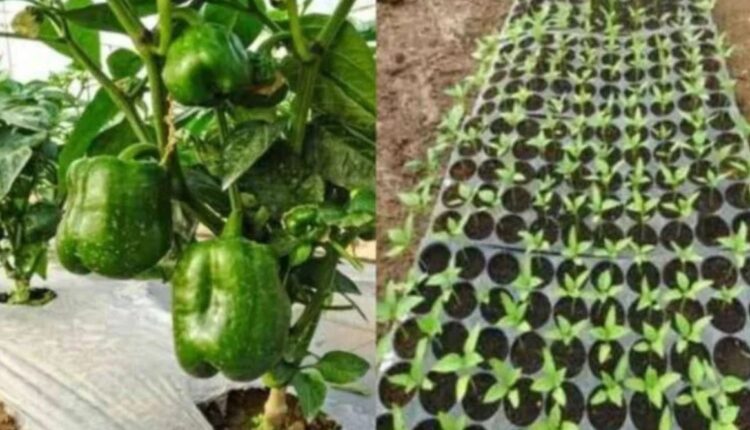Why Capsicum Cultivation trend of farmers increasing?
Know how farmers will benefit from protected cultivation of capsicum, leads to production of 80-100 tonnes per hectare
Capsicum is a major vegetable among green vegetables. Capsicum is rich in nutrients. Vitamins, calcium, magnesium, phosphorus, potassium, etc. are found in plenty. Capsicum is especially used in Chinese cuisine. The demand for capsicum is increasing day by day. In such a situation, agricultural scientists recommend that instead of producing capsicum in the traditional way, protected cultivation of capsicum should be done to meet the growing needs. This will increase production.
What is protected cultivation?
It is a structure of modern farming, in which crops are grown in a controlled environment. In this, insect-resistant net houses, green houses, polyhouse equipped with new technology, plastic low-tunnel, plastic high-tunnel, plastic mulching, drip irrigation, etc. are used. This increases the production of crops.
Protected cultivation of capsicum
Capsicum grows well in colder regions, but through protected cultivation, it can be grown throughout the year in every region. In this, the environment, temperature, and humidity are adjusted accordingly. Apart from green, capsicum is also red and yellow. Usually, in 4-5 months it gives 20-40 tonnes of crop per hectare, whereas in greenhouse cultivation of capsicum, the crop is obtained up to 80-100 tonnes per hectare. Yes but it takes 7-10 months to get ready.
Why is protected cultivation of capsicum beneficial?
In protected cultivation, plants get a better environment to grow. It protects crops from excess rain, wind, and heat. In protected farming, the outbreak of diseases and pests is reduced. The quality and yield of the crop increase. It gives 2 to 3 times more yield as compared to open cultivation. Net houses and polyhouses are the main structures used under protected cultivation. It is used more in South India, especially around Bangalore. Polyhouse is costlier than net house, but much better. Rain water does not get inside it and plants are also protected from diseases. The yield in this is also 15-20 percent more than that of net house.
Climate and soil for protected cultivation of capsicum
Well drained sandy loam soil is suitable for capsicum cultivation. For its good growth, day temperature should be between 25-30°C and night temperature should be between 18-20°C.
Prepare nursery for protected cultivation of capsicum
For protected cultivation of capsicum, first the plants have to be prepared in the nursery. Indra, Bombay, Orobel and Swarna varieties are good for capsicum cultivation in polyhouse. Better plants are prepared in nurseries from good quality seeds before planting the plants in the field or polyhouse. For this, seeds are sown in pro-trays filled with sterile cocopeats. A seed is placed in a cell or box to a depth of half a centimetre. Trays filled with seeds are placed one above the other and covered with plastic wrap until the seeds germinate. The seeds germinate after a week. Then the trays are kept in the polyhouse and after 30-35 days the plants are transplanted.
Drip irrigation and fertigation
Drip technique is used for irrigation and protected cultivation of capsicum. While water soluble fertilizers like potassium nitrate and calcium nitrate are added through fertigation for the growth of crops. This starts from the third week of transplanting.
How much is produced in protected cultivation of capsicum?
In protected cultivation, the green capsicum crop is ready after 55 to 60 days of planting, yellow capsicum after 70-75 days and red capsicum after 80-90 days. The fruits are plucked once in 3-4 days. It gives an average yield of 80-100 tonnes per hectare.
How to protect capsicum crop from diseases and pests?
Capsicum crop is prone to diseases like ‘Damping off’ and ‘Phytophthora rot’. These can be controlled by spraying Carbendazim (1 g/l) and Metalaxyl MZ (2 g/l). Capsicum is also affected by thrips, aphids and various pests like mites. These insects can be managed by spraying Chlorpyriphos (2 ml/l), Dimethoate (2 ml/l) and Dicofol (1 ml/l).
Also Read: Ornamental Fish Farming: Employment and good income
Contact us – If farmers want to share any valuable information or experiences related to farming, they can connect with us via phone or whatsapp at 9599273766 or you can write to us at “kisanofindia.mail@gmail.com”. Through Kisan of India, we will convey your message to the people, because we believe that if the farmers are advanced then the country is happy.
You can connect with Kisan of India on Facebook, Twitter, and Whatsapp and Subscribe to our YouTube channel.

